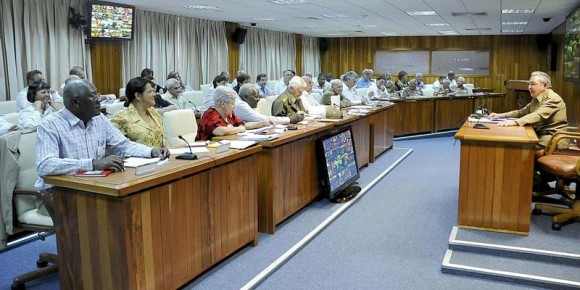
Raúl asks ministers for critical reports – and gets them
Raúl Castro has asked his ministers for a critical and constructive analysis of the measures being taken to update Cuba’s economic model, the daily Granma reported Monday (March 3).
“What we’re doing is not perfect, sometimes we lack experience in some issues and make mistakes,” the president told a gathering of the Council of Ministers on Saturday (March 1). “That is why every issue has to be constantly subjected to critical observations.”

We’re moving forward and will continue to move forward but without haste, he told his ministers.
Castro encouraged personal initiative by saying that “we are accustomed to getting our directions from above, and that has to change. The organs of direction, from the municipality of Sandino to the one in Maisí, have to express their opinions in the proper place, at the proper time and in the correct manner.”
Sandino, in Pinar del Río province, and Maisí, in Guantánamo province, are in opposite ends of the island of Cuba.
The purpose of Saturday’s meeting, according to Granma, was to approve policies for the improvement of geological research and the Cadastral Survey, which determines the tax value of the land. Decisions were also made on the creation of non-agricultural cooperatives, investment procedures, internal controls and education, among other topics.
In response to Castro’s invitation to be critical, the ministers spoke candidly about the problems they faced.
Addressing the issue of geological research, Leonardo Andollo Valdés, deputy chief of the Commission on Development, said that the government’s new policy aims “to generate and promote geological knowledge of Cuba for the purpose of expanding the resources and reserves of minerals needed by the productive sector, contributing to their efficient use and minimizing the impact of their use on the environment.”
He admitted that the documentation available for the Cadastral Survey is not up to date and in some municipalities is not even accurate. Land users are not required by law to report to the authorities on new construction on their property or changes in its use, all of which hampers tax assessments.
Marino Murillo Jorge, head of the Commission on Development, reported on the status of non-agricultural cooperatives, which by now involve commerce, gastronomy and services (186 of them), construction (12), transportation (3), industry (15), food (1), energy (5) and accounting (6).
About the creation of cooperatives, President Castro said that it is an experimental process and that any errors detected must be corrected. The provincial and municipal governments must keep track of them and retain their best qualities, he said.
“We have to analyze, not act as if the designs are impeccable,” he said. At the same time, “we cannot be too hasty in the constant approval of these cooperatives. We shall move on at the proper pace.”
Adel Yzquierdo Rodríguez, minister of the Economy and Planning, reported on the problems affecting the investment process, which include an overestimation of annual planning, insufficient control, deficiencies in contracting and the inadequate use of contracts as tools of labor, a lack of exigency in the face of poorly executed work, incorrect management of imports, technological indiscipline, low productivity and a shortage of builders.
These problems are being dealt with, the minister said.
Noting that problems in the investment process have been reported for years, President Castro emphasized the need to be demanding and to deal firmly with the administrators responsible for the flaws.
“Those who do things poorly must be taken to account for them,” he said.
Comptroller General Gladys Bejerano Portela reported that the audits made in late 2013 involved the leasing and use of farm land in usufruct, the strengthening of the farm cooperatives (UBPC), farm production for export, the substitution of imports and the sale of construction materials to the general population in the provinces of Santiago and Guantánamo.
The main problem, she said, has been the insufficient delivery of land in usufruct, a sign that the local authorities have not changed their old mentality and habits, “thus hindering the alimentary security and standard of living of the population.”
As to the sale of construction materials, she said that the shortage of such materials has led to the untimely expiration of the credits granted to home builders. She described the progress made in those areas as “discreet.”
Reports to the Council of Ministers were also delivered by the ministers of Labor, Margarita González Fernández, and Public Health, Dr. Roberto Morales Ojeda.

